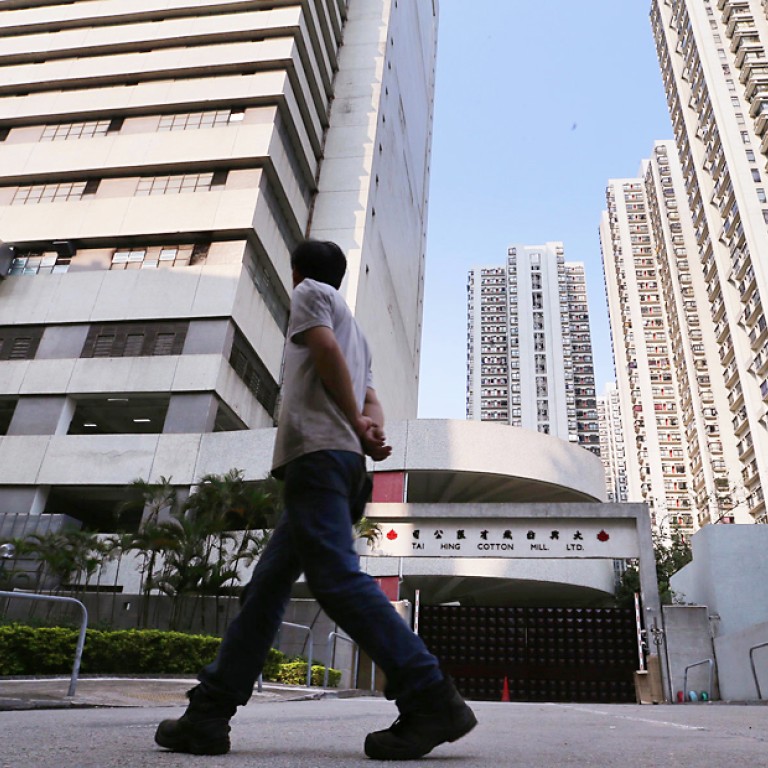
Don't let Hong Kong's product know-how go down the drain
City's factories may close but as other economies show, our firms can still utilise their knowledge and experience overseas
Hong Kong's love affair with fatalism really needs to end.
Let me explain: last week saw the closure of the Tai Hing Cotton Mill; this newspaper headlined the story with the words "end of an era", and it was accompanied by quotes to the effect that the manufacture of cotton cloth was no longer viable here.
Firms like Tai Hing can make more from property development than manufacturing
So Tai Hing is planning to establish a cotton mill somewhere overseas offering lower labour and other costs. This is quite understandable, and explains why almost all of Hong Kong's other manufacturing industries have closed or decamped.
"We just can't compete," sigh the so-called experts.
What they don't say is that companies like Tai Hing, fortunate enough to own their premises, can make more from property development than from manufacturing.
The relentless logic of capitalism is to follow the money, and it's a logic that defies argument.
However, what is lost when these manufacturing industries shut up shop is also a loss of skills and experience that in other countries have been put back to work in new ways.

Leading the pack were carmakers from the US and Germany. Only readers with short memories will fail to recall the coverage given to the alleged collapse of the US carmaking industries just a decade ago.
It was confidently predicted that US giants such as Chrysler and General Motors were destined for the dustbin of history and set to be replaced by manufacturers in China, India and South Korea.
What happened was exactly the opposite, because these places have now become lifeline markets for United States carmakers as demand for their products rises.
The range of these exports covers fully assembled vehicles, parts and transferring US technology and know-how to overseas subsidiaries and associates.
In other words, instead of adopting a fatalistic approach to the collapse of an industry where America once led the world, the carmakers have utilised their experience and knowledge not just to stay in the game but to stay on top of it.
Hong Kong industries also had a great deal of experience, ranging from electronic products to textiles to clothing and toy manufacturing.
Some of the firms that are the repositories of this experience continue to use Hong Kong as a base and maintain a development operation here while moving production across the border or further afield.
Most of these companies, however, have simply got out of the business altogether and instead are focused on their property holdings to make money. Some retain an interest in overseas manufacturing, but the significance of the Hong Kong base to their businesses is minimal.
Those who believe that former manufacturers will be able to indefinitely rely on the property market will probably conclude that these firms are pretty shrewd.
However, there is another view, curiously and persistently expressed by the Hong Kong government, which keeps promoting new industries and is slightly obsessed with pouring money and other resources into science parks, hi-tech hubs and other schemes - such as the wonderfully absurd wine hub, where Hong Kong has no core competence and there is little to show for this government's enthusiastic scattering of public money and cash in kind.
The "international wine hub" is almost a classic example of what happens when you give bureaucrats a role in developing industries.
While it is true that Hong Kong has indeed become a wine trading centre, although obviously not a place for wine production, it is equally true that the contribution of the international wine trade to Hong Kong's economy is negligible.
Most of this business is controlled by international companies employing very few people in Hong Kong and contributing very little to the overall economy.
One way a contribution might have been made would have been to collect taxes on wine sales, but these were abolished. So what's left is an industry that's the subject of government boasting but in reality just using Hong Kong as a pleasant transit point.
Instead of looking around to harness skills and experience, the government pours money into, for example, shutting down the fishing industry (this cash is under review for the scams it generated) or dishing out big swathes of land to companies that can be presented as working in the field of new technology.
So let's come back to the textile industry and see what's happened in other countries where mass production has moved away but the accumulated skills and knowledge have been utilised to maintain and upgrade their industries.
In Italy, for example, not only is textile and clothing design flourishing but manufacturing has been revived in high-yield upmarket sectors of the industry.
In Britain, shoemaking was a traditional industry which was virtually extinguished, but is coming back with bespoke manufacturing and product design.
Hong Kong, meanwhile, clings to a middleman role in all manner of things, even though the trend of history shows that it is the fate of middlemen to be squeezed out.

